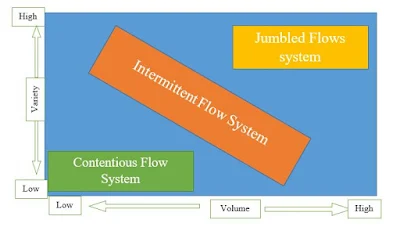Type of manufacturing system
Flow shops or continuous manufacturing system
- Continuous manufacturing systems are designed to enable the mass production of a single product with a special-purpose machine.
- This system can have high production rates.
- The product goes through an assembly line with different stations where parts are added or worked on a little further.
- The skill level of the laborer tends to be lower than in production job shop
- The material flow is through a sequence of operations by material handling devices.
- This type of production system is ideal when a company has very high volume targets since it reduces the unit cost of the product.
- The time the item spends in each station or location is fixed and equal.
- The workstations are arranged in line according to the processing sequence needed
problems in a streamlined flow
- Ensuring continuous flow
- Work/Capacity Balancing
- Importance of Maintenance Management
- Good Quality Assurance System

Intermittent Manufacturing System
- The intermittent manufacturing system permits companies to make different types of goods using the same production line.
- The manufacturing facility is designed to handle different product sizes and requirements. Generally, the goods are processed in batches to fulfill orders.
- This system is commonly referred to as a “job shop” due to its popularity in countries with relatively cheap labor making products for multinationals based thousands of miles away.
- The goods made using this manufacturing method are produced in small quantities, so they may not be suitable for stock. Customization is typically done post-purchase.
- This type of system is designed for production runs that happen intermittently, hence the name, or products that don’t require high volumes.
- It uses general-purpose machines and requires highly skilled labor.
Feature of Intermittent Manufacturing System
- Characterized by mid-volume, mid-variety products/services
- Increases the flow complexities
- Flow and capacity balancing are difficult but important
- Batch Processing
- Alternative methods of work organization
- Capacity Estimation is hard
- Production Planning & Control is complex
Flexible Manufacturing Systems or jumbled manufacturing-
- Flexible manufacturing is a modern manufacturing system that has become very popular.
- An FMS integrates all major elements of manufacturing into a highly automated system
- It involves a significant investment in machinery, although it reduces labor costs by implementing robots eschewing human labor altogether.
- These machines can easily be reconfigured to manufacture different products in different quantities, and the whole process is automatic.
- This method is called flexible manufacturing due to the flexibility in the variety of high-volume goods it can produce.
- In this process major capital investment and efficient machine utilization are essential.
- Due to the automated process, quality control is a lot easier, and unit costs are low.
Advantages of FMS
- Parts can be produced randomly in batch sizes, as small as one, and at a lower cost.
- The lead times required for product changes are shorter.
- Labour and inventories are reduced.
- Production is more reliable because the system is self-correcting and so product quality is uniform.
- Increased machine utilization.
- Fewer machines required.
- Reduced factory floor space.
- Greater responsiveness to change






0 Comments
Thank for Visiting our site
we will Happy to see you here again